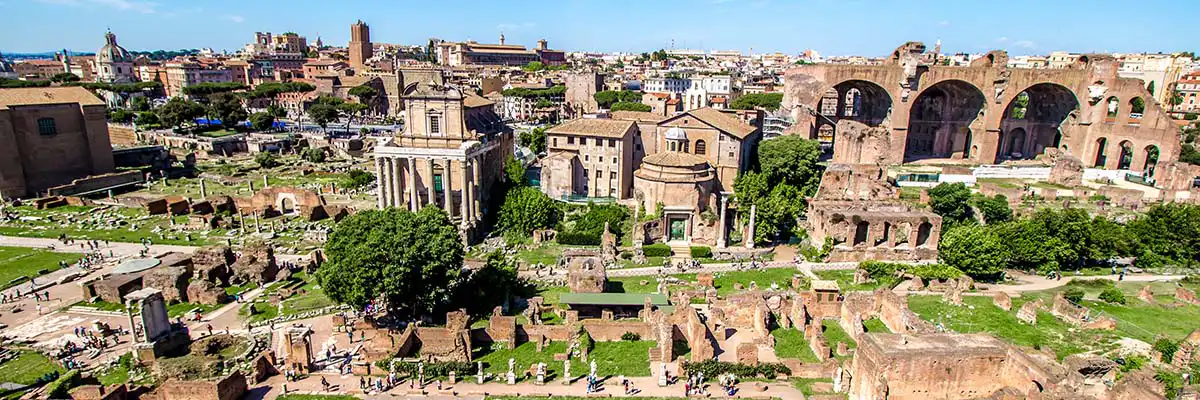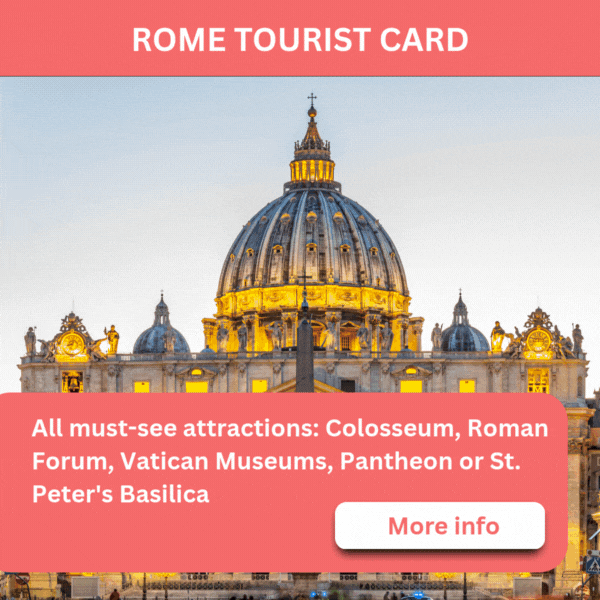
Roman Forum Romanum & Palatine Hill
Visit the Roman Forum and Palatine Hill in Rome - Tours & Tickets

Do you need tickets the Forum Romanum in Rome? Useful info, opening hours, guided tours and entrance tickets for visiting the Roman excavations of the Forum Romanum, Palatine hill and Colosseum.
Tours & Tickets Forum Romanum & Palatine |
|
| Address | The Forum Romanum has two entrances: Via della Salara Vecchia, 5/6 and Via di San Gregorio. You can also visit the Forum Romanum via the entrance of the Palatine Hill. |
| Metro | Stop Colosseo (line B) |
| Tickets |
📌 Please note that you can visit the Forum Romanum and Palatine hill with the combined ticket of the Colosseum. Tickets are almost exclusively sold online. The chance of getting tickets at the box office is small. Therefore always book your Forum Romanum tickets online. Pay attention to the type of ticket you want to book:
📌 Best deal: The Rome City Pass is the perfect city pass with all tickets you need for your Rome city break (including Colosseum, Forum Romanum and Vatican Museums with Sistine Chapel). This card will save you money and time (more info Rome City Pass). 1. Combi Tickets (+ Colosseum) 2. Only Forum + Palatine 3. Rome City Pass Guided toursWould you like a guided tour? Then choose from one of the tours below in which you can learn more about the interesting history of the Roman forum:
|
| Hours |
|
| Attention | No food or drinks are sold on the Forum Romanum and Palatine hill. There are taps available where you can refill bottles of water. Please keep in mind that your visit can easily take a few hours. |
Forum Romanum or the 'Roman Forum'
It was not until the 19th century that excavations of the centre of the Roman empire at the base of the Capitol finally began. During the reign of emperor Augustus (27 BCE – 14 CE), ancient Rome was already home to over a million Romans, and the Forum Romanum was the political, legal and religious centre of the Roman Empire.
During your visit, you walk by the many ruins of the Forum Romanum. Unfortunately, many buildings were damaged by earthquakes and plundering after the 7th century, but also by construction of palaces and churches such as St. Peter’s Basilica. However, the excavations can still tell you a lot about the history of the Roman Empire and no trip to Rome would be complete without a visit to the Forum Romanum.
Visit the ancient center of Rome
You get to the Forum Romanum via the Via Sacra, the oldest and most famous road in Rome. The name ‘Sacred street’ is derived from the many temples and other holy sites that lined this street. Examples are the round Temple of Vesta, the Temple of Saturn, the basilica of Maxentius, and the official residences of the pontifex maximus, the arch of Septimus Severus and the rex sacrorum. You will also see the remains of arches, the speaker's platform, market halls and much more. Tip: Capitoline hill offers a magnificent view of the Roman Forum, giving you a good overview of the whole. It even has lovely lighting at night.
 Excavations of the Forum Romanum from the Palatine Hill
Excavations of the Forum Romanum from the Palatine Hill History of Forum Romanum
Until the 7th century BCE, the area between the hills of the Capitol, Palatine and Esquiline was a large swamp. It was used as a cemetery in those days, but it was not until after the 7th century BCE that the swamp was drained when the sewerage system of the Cloaca Maxima was built. The Temple of Saturn and the Temple of the Dioscuri were part of the first settlement there. During the 2nd century BCE, development of the forum accelerated after the power of the Roman Empire continued to grow in the Mediterranean. Beginning in 54 BCE, the so-called imperial fora (Fora Imperiali) arose next to the Forum Romanum, intended to preserve their fame for the ages. The most famous fora – which are still partially covered by nearby buildings – are:
- Forum of Caesar (Foro di Caesare) with the temple of Venus Genetrix.
- Forum of Augustus (Foro di Augusto) with the temple of the god of war Mars Ultor.
- Forum of Vespasian with the temple of peace
- Forum of Trajan, the most impressive forum
 The Palatine Hill from Circus Maximus
The Palatine Hill from Circus MaximusPalatino (Palatine hill)
The Palatine hill is one of the seven hills of Rome. During the 9th century BCE it became a residential neighbourhood that would later be home to important Romans such as Cicero, Crassus, Augustus and Tiberius. This last emperor ensured the 43-metre high hill's reputation as imperial residence. According to legend, Rome was founded by Romulus on Palatine Hill in 753 BCE.
Today, Palatine Hill is a major archaeological park and connected to the Forum Romanum. In the centre of Palatine hill, you can find – among other monuments – the impressive buildings of emperor Domitian (Domus Augustana) and the 16th-century gardens of cardinal Alessandro Farnese. The Antiquarium can also be found on Palatine Hill. This museum contains models of the first settlements and archaeological finds.
Roman Forum and Palatine Hill Tickets & Tours
Do you need tickets the Roman Forum? It is always recommended to purchase one of the following entrance tickets or tours. During the high season, the combination tickets with the Colosseum is certainly sold out quickly. Choose one of these entrance tickets:
Video: Reconstruction of the Foro Romano
Where is the Roman Forum in Rome?
The Roman Forum is located in the center of Rome, Italy. It is located next to the Colosseum in the Rione Campitelli district, between the Palatine Hill and Capitoline Hill. The Roman Forum used to be the political, religious and social center of ancient Rome. It was once dominated by numerous public buildings, temples, basilicas and monuments. Today, ruins and remains can still be seen, testifying to the grandeur of the ancient Roman Empire. Do you need tickets the Forum Romanum? Yes, you can only visit the ancient site with tickets or guided tours. Colosseo metro stop is near the entrance to the archaeological area.








